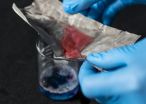(Press-News.org) NEW YORK (April 15, 2015) -- Weill Cornell Medical College investigators tried to validate a previously reported molecular finding on triple negative breast cancer that many hoped would lead to targeted treatments for the aggressive disease. Instead, they discovered that the findings were limited to a single patient and could not be applied to further clinical work. This discovery, published April 15 in Nature, amends the earlier work and underscores the importance of independent study validation and careful assay development.
The earlier - and now dispelled - study, published in Nature in June 2012 by researchers at the Broad Institute of MIT and Harvard, found a gene fusion in a small but significant number of tumor samples from patients with triple negative breast cancer, a particularly deadly subtype that often has few treatment options. The original research team concluded that MAGI3-AKT3 fusion could offer a new molecular target to use for drug development.
Soon after this study was published, a Weill Cornell team led by Drs. Mark A. Rubin, Sandra J. Shin and Juan Miguel Mosquera, set out to determine if and how often the gene fusion occurred in Weill Cornell's own collection of triple negative breast cancer samples.
"Large genomic studies are reporting reams of new mutation data, and some are short on validation," said study co-senior author Dr. Rubin, director of the Institute for Precision Medicine at Weill Cornell and NewYork-Presbyterian Hospital.
They developed a tissue-based assay test that could reveal samples positive for MAGI3-AKT3 fusion, an approach that is typically used in developing biomarkers, an area in which the Weill Cornell team is expert. They were surprised that none of the Weill Cornell samples were positive for this mutation.
"The finding of MAGI3-AKT3 fusion by respected researchers and published in a top journal offered great hope and a sense of excitement about developing a new therapeutic target for triple negative breast cancer," said Dr. Shin, the co-senior author of the study, who is also the chief of breast pathology and an associate professor of pathology and laboratory medicine at Weill Cornell Medical College.
"We clarified that the initially reported mutation was not recurrent and with the exception of one case, was an artifact," said Dr. Mosquera, an assistant professor of pathology and laboratory medicine at Weill Cornell Medical College and pathology leader of the Institute for Precision Medicine. "Our work highlights that pathology is essential for verification in this type of scenario. The initial finding has to be amended and acknowledged."
To fully invalidate the MAGI3-AKT3 fusion finding, the Weill Cornell team went through a lengthy process that started with screening 150-plus in-house samples. They expected to find that about 7 percent of them contained the gene fusion, as was the case in the original Nature paper, but instead found zero matches. They noticed that the original tumors studied in 2012 -- save the index case -- were never verified to have this alteration at the genomic level. Instead, the initial team of researchers had used a screening test on RNA and based on these findings, made the assumption that additional tumors also had the mutation.
The Weill Cornell team further tested more than 100 additional samples from The Cancer Genome Atlas and University Hospital Zurich. They were also unable to confirm the original finding in these cases.
They communicated their results to Nature and to the Broad Institute investigators almost two years ago, leading those researchers to reanalyze their 72 patient samples, plus an additional 370 breast tumors. When they went back and re-tested the samples at the DNA level, they found the gene fusion only in the first case that triggered this longer study, making it an isolated finding that cannot be applied to develop future clinical trials.
The Weill Cornell team agrees that the MAGI3-AKT3 fusion finding should have been validated at the genomic level before those results were ever published.
"Our study demonstrates the important process of biomarker development and addresses an important point in precision medicine," said Dr. Rubin, who is also the Homer T. Hirst III Professor of Oncology in Pathology at Weill Cornell.
"It is gratifying to know that our results have saved many investigators time, effort and resources toward a goal that was ultimately not achievable," Dr. Shin said. "Just as importantly, patients have been spared from participating in a clinical trial that could not have led to a positive result."
INFORMATION:
Weill Cornell Medical College
Weill Cornell Medical College, Cornell University's medical school located in New York City, is committed to excellence in research, teaching, patient care and the advancement of the art and science of medicine, locally, nationally and globally. Physicians and scientists of Weill Cornell Medical College are engaged in cutting-edge research from bench to bedside aimed at unlocking mysteries of the human body in health and sickness and toward developing new treatments and prevention strategies. In its commitment to global health and education, Weill Cornell has a strong presence in places such as Qatar, Tanzania, Haiti, Brazil, Austria and Turkey. Through the historic Weill Cornell Medical College in Qatar, the Medical College is the first in the U.S. to offer its M.D. degree overseas. Weill Cornell is the birthplace of many medical advances -- including the development of the Pap test for cervical cancer, the synthesis of penicillin, the first successful embryo-biopsy pregnancy and birth in the U.S., the first clinical trial of gene therapy for Parkinson's disease, and most recently, the world's first successful use of deep brain stimulation to treat a minimally conscious brain-injured patient. Weill Cornell Medical College is affiliated with NewYork-Presbyterian Hospital, where its faculty provides comprehensive patient care at NewYork-Presbyterian Hospital/Weill Cornell Medical Center. The Medical College is also affiliated with Houston Methodist. For more information, visit weill.cornell.edu.
Office of External Affairs
Weill Cornell Medical College
tel: 646.317.7401
email: pr@med.cornell.edu
Follow WCMC on:
Twitter, Facebook, and Instagram
GAINESVILLE, Fla. -- Oxycodone-related deaths dropped 25 percent after Florida implemented its Prescription Drug Monitoring Program in late 2011 as part of its response to the state's prescription drug abuse epidemic, according to a team of UF Health researchers. The drop in fatalities could stem from the number of health care providers who used the program's database to monitor controlled substance prescriptions.
"Forty-nine states have prescription drug monitoring programs of some kind, but this is the first study to demonstrate that one of these programs significantly ...
COLUMBUS, Ohio--The unassuming piece of stainless steel mesh in a lab at The Ohio State University doesn't look like a very big deal, but it could make a big difference for future environmental cleanups.
Water passes through the mesh but oil doesn't, thanks to a nearly invisible oil-repelling coating on its surface.
In tests, researchers mixed water with oil and poured the mixture onto the mesh. The water filtered through the mesh to land in a beaker below. The oil collected on top of the mesh, and rolled off easily into a separate beaker when the mesh was tilted.
The ...
April 15, 2015 - Most people who attempt suicide make some type of healthcare visit in the weeks or months before the attempt, reports a study in the May issue of Medical Care, published by Wolters Kluwer.
The study also identifies racial/ethnic differences that may help to target suicide prevention efforts in the doctor's office and other health care settings. The lead author was Brian K. Ahmedani, PhD, LMSW, of Henry Ford Health System, Detroit, Mich.
Health Visits May Provide Chances for Suicide Prevention
Using data from the NIMH-funded Mental Health Research ...
Index shows nearly two points increase in EU overall, but Greece and Latvia fall behind
Sweden tops the table, while UK comes fourth with increase in line with EU average
A healthy and active old age is a reality for many Europeans and is a genuine possibility for many more, despite the 2008 economic crash and years of austerity measures, according to a new United Nations Economic Commission for Europe (UNECE) and European Commission (EC) report, produced at the University of Southampton.
However, countries such as Greece and Latvia have declined in active ageing ...
New work by Ludwig-Maximilians-Universitaet (LMU) in Munich researchers demonstrates that macrophages can effectively substitute for so-called dendritic cells as primers of T-cell-dependent immune responses. Indeed, they stimulate a broader-based response.
The immune response, the process by which the adaptive immune system reacts to, and eliminates foreign substances and cells, depends on a complex interplay between several different cell types. So-called dendritic cells, which recognize and internalize invasive pathogens, play a crucial role in this process. Inside ...
NEWPORT, Ore. - A team of scientists from the United States and Russia has documented the longest migration of a mammal ever recorded - a round-trip trek of nearly 14,000 miles by a whale identified as a critically endangered species that raises questions about its status.
The researchers used satellite-monitored tags to track three western North Pacific gray whales from their primary feeding ground off Russia's Sakhalin Island across the Pacific Ocean and down the West Coast of the United States to Baja, Mexico. One of the tagged whales, dubbed Varvara (which is Russian ...
Anti-fungal drug shows promise as potential new cancer treatment
A common anti-fungal treatment has joined the ranks of drugs that may be suitable for use in treating cancer, according to research from the Repurposing Drugs in Oncology (ReDO) project published in ecancermedicalscience.
The ReDO project is an international collaboration of anticancer researchers dedicated to promoting the cause of common medicines which may represent an untapped source of novel therapies for cancer.
In partnership with ecancer, the ReDO project is publishing a series of papers on drugs ...
Twitter users who post information about their personal health online might be considered by some to be "over-sharers," but new research led by the University of Arizona suggests that health-related tweets may have the potential to be helpful for hospitals.
Led by Sudha Ram, a UA professor of management information systems and computer science, and Dr. Yolande Pengetnze, a physician scientist at the Parkland Center for Clinical Innovation in Dallas, the researchers looked specifically at the chronic condition of asthma and how asthma-related tweets, analyzed alongside ...
WASHINGTON (April 15, 2015) -- The George Washington University (GW) Cancer Institute has finalized 45 core competency statements for oncology patient navigators, who have become critical members of the health care team. These competency statements were published in the Journal of Oncology Navigation and Survivorship and were created through literature review, focus group data analysis, expert review, and a national survey of oncology patient navigation stakeholders.
"Patient navigation is a rapidly growing health profession given new accreditation standards from the ...
Mathematical ideas and tools are often used to describe aspects of large macroscopic systems. Examples abound in areas as varied as finance to psychology. In a paper published last month in the SIAM Journal on Applied Mathematics, author Fabio Bagarello proposes mathematical models to analyze political decision-making. Using a dynamical approach which accounts for interactions between political parties and their constituents, the model tries to deduce whether parties should form coalitions under various circumstances.
"Mathematics is important in many aspects of social ...


